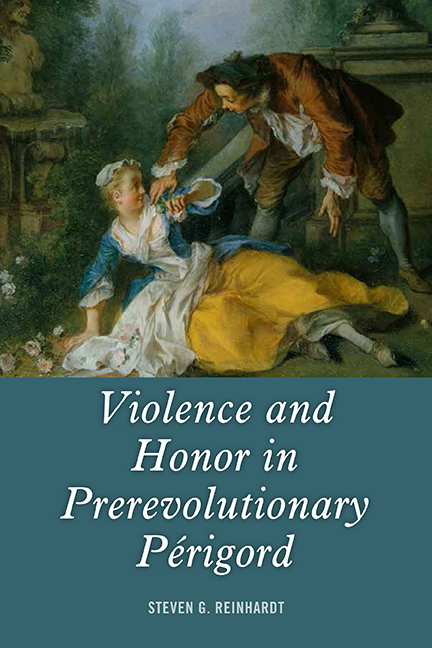Book contents
- Frontmatter
- Dedication
- Contents
- Acknowledgments
- Maps
- Introduction: “The Saint of Honor”
- 1 Violence and Honor
- 2 Honor in a Cross-Cultural Context
- 3 From Honor to Honnêteté in Old Regime Europe
- 4 “The Good Old Days” in Prerevolutionary Sarladais
- 5 “The Saint of Honor” in the Sénéchaussée of Sarlat
- 6 Women and Honor-Related Criminal Affaires
- 7 Policing Honnêteté: Shameful, Sinful, and Criminal Conduct
- 8 “Fallen Women” and Infanticide
- 9 Compromised Honor and Dangerous Liaisons
- 10 Honor and Homicide
- Conclusion
- Notes
- Bibliography
- Index
10 - Honor and Homicide
Published online by Cambridge University Press: 10 June 2021
- Frontmatter
- Dedication
- Contents
- Acknowledgments
- Maps
- Introduction: “The Saint of Honor”
- 1 Violence and Honor
- 2 Honor in a Cross-Cultural Context
- 3 From Honor to Honnêteté in Old Regime Europe
- 4 “The Good Old Days” in Prerevolutionary Sarladais
- 5 “The Saint of Honor” in the Sénéchaussée of Sarlat
- 6 Women and Honor-Related Criminal Affaires
- 7 Policing Honnêteté: Shameful, Sinful, and Criminal Conduct
- 8 “Fallen Women” and Infanticide
- 9 Compromised Honor and Dangerous Liaisons
- 10 Honor and Homicide
- Conclusion
- Notes
- Bibliography
- Index
Summary
In honor cultures, violence—even lethal violence—can be a normative part of human relations. The imperatives of honor dominate people's behavior, and all words and gestures are variables that factor into the endless calculation and recalculation of the total of a person's honor. As a culture of honor slowly erodes, however, people become less inclined to utilize direct action themselves or permit others to do so. In early modern Europe, Muchembled contends, the level of violence gradually decreased with each generation:
The principal motor for change is to be found in the everyday control of the gestures of each individual by the community. The civilizing process was taking effect, here as in all the large towns of Europe. It was not being imposed only by rules of politeness and civility. They effectively created sensitive, charitable men and women, capable of mastering their impulses and purging their vocabulary so as to avoid insults and confrontations in public.
The effect first became apparent on the streets of the larger urban centers of France and England, where it was most evident among the upper and middle classes.
Such was undoubtedly the case even in prerevolutionary Sarladais, where official justice was beginning to replace private justice not only because it was successfully imposed from the top down but also because demand grew from below. An expanding segment of the population (the “legal community”) came to view the personally enforced, quasi-judicial methods of private justice as unsatisfactory. Analysis of the socioeconomic status of plaintiffs before the Sénéchaussée of Sarlat during the last two decades of the eighteenth century suggests that this small segment of the population was becoming appreciative of the judicial services provided by the court, which, after all, afforded a more formal, anonymous, and predictable alternative. The authorities had by then managed to curtail revenge killings and had turned their attention to property crimes, but the great majority of the peasantry was still immersed in what was basically a culture of honor. In other words, they continued to opt for unofficial justice with its private means of recalibrating honor via nonlethal measured violence and its emphasis on infra-judicial dispute settlement to handle personal affairs.
- Type
- Chapter
- Information
- Violence and Honor in Prerevolutionary Périgord , pp. 217 - 242Publisher: Boydell & BrewerPrint publication year: 2018

